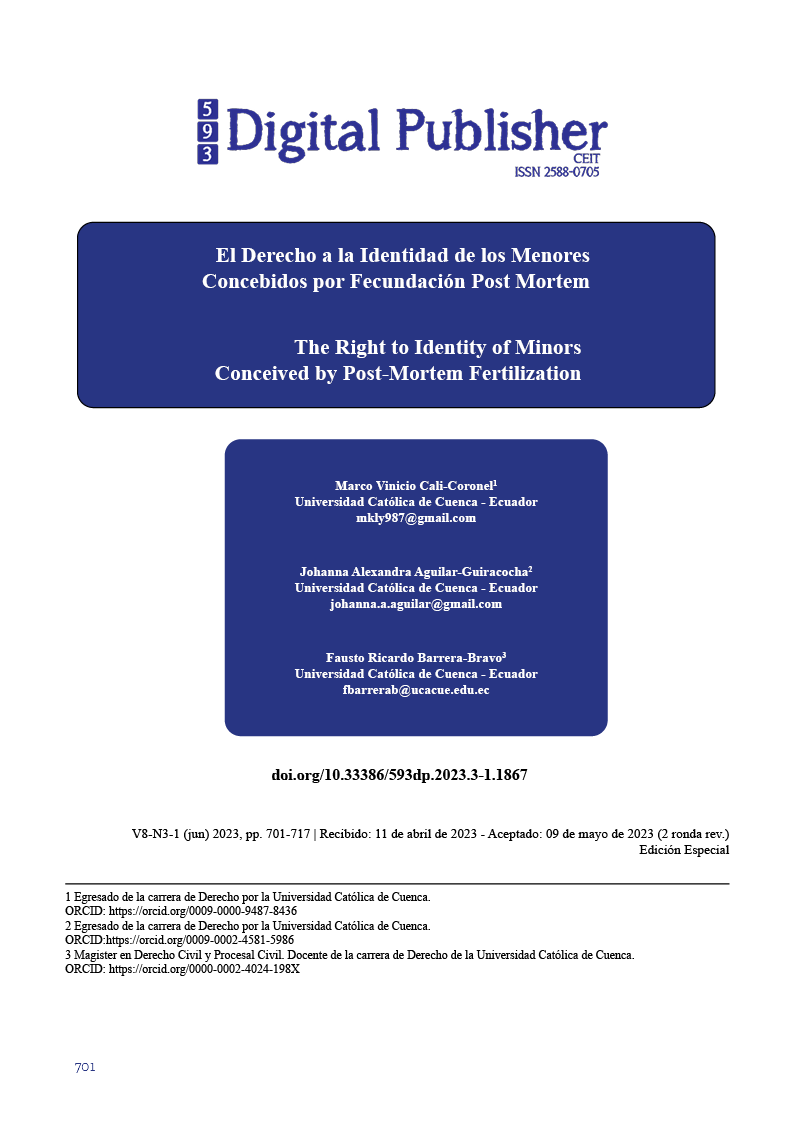The right to identity of minors conceived by post-mortem fertilization
Main Article Content
Abstract
With the emergence of assisted human reproduction techniques, family dynamics different from those we traditionally know are born for the right, post mortem fertilization is one of them and raises the possibility that women can conceive a new being even after the death of their spouse or sentimental partner, using for this the genetic material of the deceased person (sperm) or constituted embryos but that have not been implanted in the woman. In this context, this article analyzed the problems involved in the birth of people through the postmortem fertilization technique and the impossibility of being able to relate the child to the deceased father, which causes the right to identity of these minors to be affected. Due to not being able to fully guarantee one of the elements that make up this right, for this, the systematic method was used in order to determine the scope of this right and the implications of this practice in case it occurs in Ecuador. With this, it was possible to demonstrate that although the Constitution of the Republic recognizes and guarantees the right to identity, there are still barriers that prevent all children from seeing their right materialized, due to the lack of regulation in Ecuador regarding access, procedures and requirements in the use of assisted human reproduction techniques.
Downloads
Article Details

This work is licensed under a Creative Commons Attribution-NonCommercial-ShareAlike 4.0 International License.
1. Derechos de autor
Las obras que se publican en 593 Digital Publisher CEIT están sujetas a los siguientes términos:
1.1. 593 Digital Publisher CEIT, conserva los derechos patrimoniales (copyright) de las obras publicadas, favorece y permite la reutilización de las mismas bajo la licencia Licencia Creative Commons 4.0 de Reconocimiento-NoComercial-CompartirIgual 4.0, por lo cual se pueden copiar, usar, difundir, transmitir y exponer públicamente, siempre que:
1.1.a. Se cite la autoría y fuente original de su publicación (revista, editorial, URL).
1.1.b. No se usen para fines comerciales u onerosos.
1.1.c. Se mencione la existencia y especificaciones de esta licencia de uso.
References
Alza, C. (2017). El Concebido In-Vitro Post Mortem y sus Derechos Sucesorios. Derecho y Sociedad, 49.
Asamblea General de las Naciones Unidas. (1948). Declaración Universal de Derechos Humanos.
Asamblea Nacional. (2005). Código Civil. VLex. https://app-vlex-com.vpn.ucacue.edu.ec/#search/jurisdiction:EC/código+civil/WW/vid/631479779
Asamblea Nacional. (2008). Constitución de la República del Ecuador.
Asamblea Nacional. (2016a). Borrador Para Segundo Debate Del Proyecto De Código Orgánico De Salud. Ministerio de Salud Pública, 1–151. https://www.salud.gob.ec/enterate-mas-sobre-el-proyecto-de-ley-codigo-organico-de-salud/
Asamblea Nacional. (2016b). Ley Orgánica de Gestión de la Identidad y Datos Civiles. Registro Oficial Suplemento 684 de 04-Feb.-2016.
Cámara de Diputados de la Nación Argentina. (2016). Código Civil y Comercial de la Nación. http://scholar.google.com/scholar?hl=en&btnG=Search&q=intitle:No+Title#0
Congreso Nacional. (2014). Código de la niñez y adolescencia. Registro Oficial No. 737, Publicado el 3 de enero de 2003.
Constitucional, C., & Salazar, D. (2021). Sentencia No. 2185-19-JP y acumulados/21 ( Inscripción del nacimiento de hijas e hijos de adolescentes migrantes) Jueza ponente: Daniela Salazar Marín. 21(2185), 1–55.
Corte IDH. (2011). Caso Gelman Vs. Uruguay. 2011, 92. https://www.corteidh.or.cr/docs/casos/articulos/seriec_221_esp1.pdf
Craviotto, P. (2021). Seguridad jurídica de los derechos sucesorios en la fecundación post mortem en España Legal certainty of post-mortem fertilisation inheritance rights in Spain *. 79–104. https://doi.org/10.14679/1268
Escribano, P. (2016). Algunas cuestiones que plantea la reproducción humana asistida post mortem en la actualidad. In Anuario de Derecho civil (Vol. 69, pp. 1259–1320).
Fernández, C. (1992). DAÑO A LA IDENTIDAD PERSONAL. Editorial Astrea, Buenos Aires, 245–272. http://www.tse.go.cr/ifed/pdf/identidad_personal.pdf
Jefatura del Estado. (2006). Ley 14/2006, de 26 de mayo, sobre técnicas de reproducción humana asistida. Boletín Oficial Del Estado, BOE No 126. https://www.boe.es/buscar/pdf/2006/BOE-A-2006-9292-consolidado.pdf
Krasnow, A. (2017). La filiación por técnicas de reproducción humana asistida en el Código Civil y Comercial argentino. Un avance que permite armonizar la norma con la realidad. Revista de Derecho Privado, 32. https://doi.org/10.18601/01234366.n32.07
Lamm, E. (2012). La importancia de la voluntad procreacional en la nueva categoría de filiación derivada de las técnicas de reproducción asistida. Revista de Bioética y Derecho, 24, 76–91. https://doi.org/10.4321/S1886-58872012000100008
Martínez, H. (2018). Fertilización post mortem. Revista Venezolana de Legislación y Jurisprudencia, 11, 367–396. www.tsj.gov.ve/decisiones/scon/Julio/1456-270706-05-1471.htm.
Moadie Ortega, V. (2015). REFLEXIÓN CRÍTICA SOBRE LA FECUNDACIÓN POST-MORTEM COMO TÉCNICA DE REPRODUCCIÓN ASISTIDA EN EL ORDENAMIENTO JURÍDICO COLOMBIANO Y SU INCIDENCIA EN EL ÁMBITO FILIAL Y SUCESORAL. XI Jornadas de Sociología. https://www.aacademica.org.
Oliver, E. (2013). La reproducción humana asistida post mortem. Universitat de Les Illes Balears.
Organización de Estados Americanos. (1969). Convención Americana sobre Derechos Humanos o Pacto de San José de Costa Rica. Tratados Multilaterales Interamericanos, 9460, 24.
Pérez, M. (2013). El entorno familiar y los derechos de las niñas, los niños y los adolescentes: una aproximación. Scielo.
Rodríguez, J. (2022). La fecundación post mortem y la necesidad de su regulación en el sistema legal argentino.pdf.
Sala de lo Civil y Mercantil. (1996). RECONOCIMIENTO DE HIJO POR TESTAMENTO. Serie XVI, 1141.
Santolaria, I., & Ramón, F. (2020). Determinación de la filiación y derechos sucesorios en la reproducción humana asistida post mortem en España. In Anales de la Facultad de Ciencias Jurídicas y Sociales de la Universidad Nacional de La Plata (Issue 50, p. 036). https://doi.org/10.24215/25916386e036




